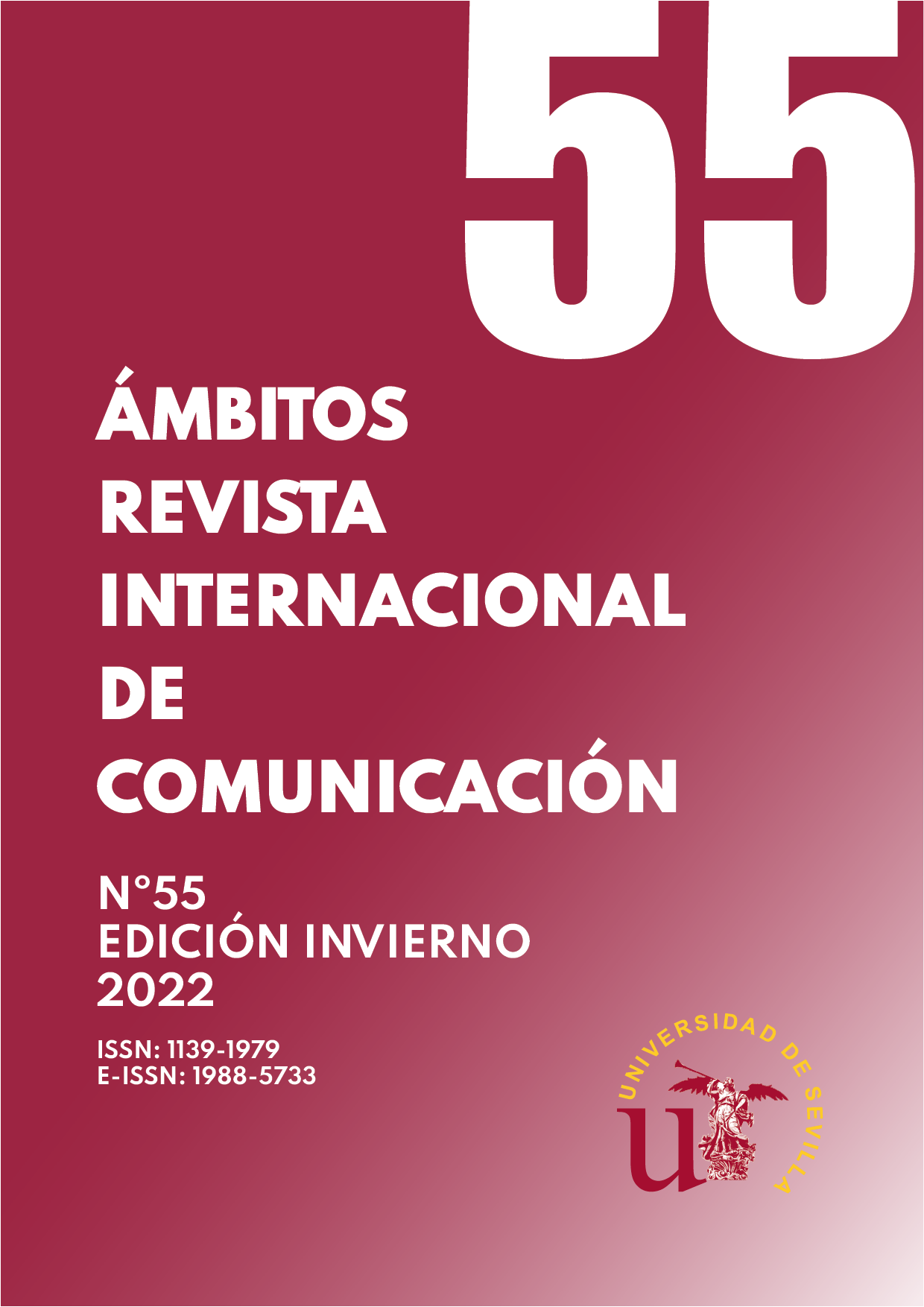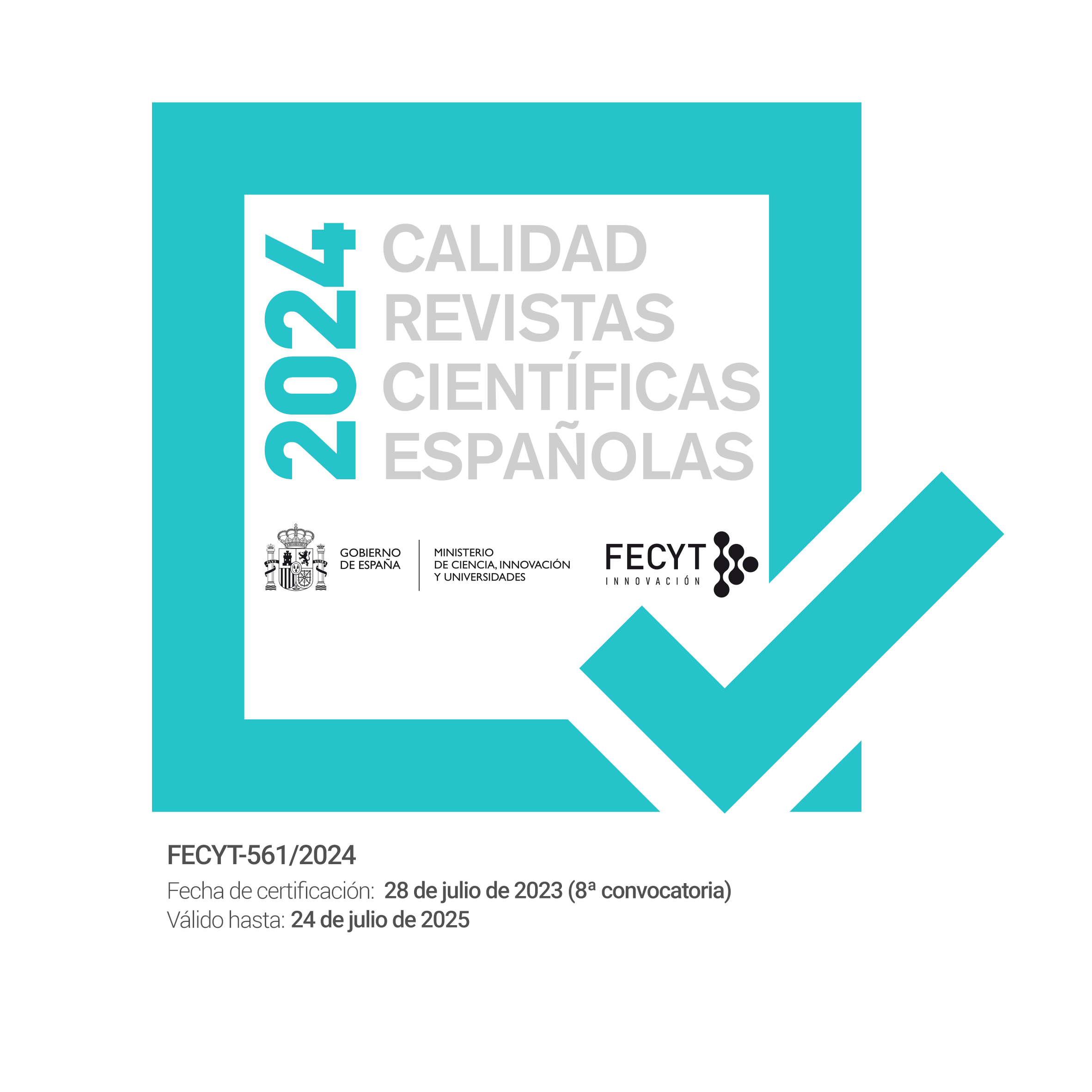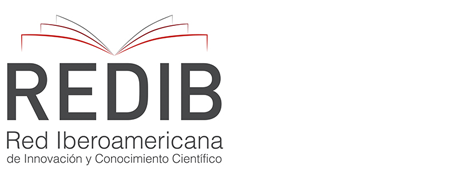The post-modern individual in Yorgos Lanthimos’ cinema
DOI:
https://doi.org/10.12795/Ambitos.2022.i55.10Keywords:
Yorgos Lanthimos, film analysis, fílmico, posmodernismo, neoexistencialismo, identidadAbstract
In 2018, Yorgos Lanthimos’ film The Favourite received 10 Oscar nominations. The director also became a regular in Cannes. These awards are a great recognition of Lanthimos' success, and are even more poignant for an alternative filmmaker who started in crisis-hit Greece. This work analyses Lanthimos’ films and deliberates about the portrait the author makes of the post- modern individual. It identifies the common characteristics throughout its filmography and from those observations it invites meditation on the current capitalist system. It argues that in contemporary post-modern society individuals have suffered a strong alienating process in which subjectivity has been denied. Romantic relationships have become an immediate and disposable source of pleasure and sex has become a consumable good. Language has shown its inefficiency in creating emotional ties between people and also in its purpose of making sense of reality and it has become a tool for the powerful to keep their subjects under control. As a consequence, individuals are unable to connect with each other and in the absence of a common goal they find themselves completely isolated and alone.
Downloads
Metrics
References
Alfajora, J. C. (2011). On Language and Morality. Rethinking the Role of Language in the Formation of Moral Values through analysis of Lanthimos’ Dogtooth. https://tinyurl.com/aw3vhvec
Almodóvar, P. (Director). 2011. La Piel que habito [película]. El Deseo P. C., Blue Haze Entertainment, Canal+ España, Televisión Española, Instituto de la Cinematografía y de las Artes Audiovisuales, FilmNation Entertainment.
Arditi, G. (2018). Amor y Capitalismo. Revista Ariel, 22, 41-50. https://tinyurl.com/57jtwun8
Bauman, Z. (2003). Modernidad líquida. Fondo de Cultura Económica.
Bauman, Z. (2005). Amor líquido. Acerca de la fragilidad de los vínculos humanos. Fondo de Cultura Económica.
Betancur, M. C. (2010). Persona y Máscara. Praxis Filosófica, 30, 127-143. https://doi.org/10.25100/pfilosofica.v0i30.3419
Bordwell, D. (1996). La Narración en el Cine de Ficción. Paidós.
Cooper, S. (2016). Narcissus and The Lobster. Studies in European Cinema, 13(2). https://doi.org/10.1080/17411548.2016.1216373
D’angelo, V. (2016). La máscara que luego estoy siguiendo. Sobre la relación entre cuerpo y sujeto en la obra de Erving Goffman. Daimon: Revista Internacional de Filosofía, 5, 389-398. https://doi.org/10.6018/daimon/268931
Deleuze, G. y Guattari, F. (1994). Mil mesetas: Capitalismo y esquizofrenia. Pre-textos.
Eagleton, T. (1997). Las ilusiones del posmodernismo. Paidós.
Fairclough, N. (1989). Language and Power. Longman.
Goffman, E. (1997). La presentación de la persona en la vida cotidiana. Amorrortu.
Grobar, M. (2018). The Favourite DP Robbie Ryan Brings Fisheye Lenses & Fluid, Roving Camera To Yorgos Lanthimos’ Madcap Period Piece. Deadline. https://tinyurl.com/4yab7hek
Fisher, M. (2011). Dogtooth: The Family Syndrome. Film Quarterly, 64(4), 22-27. https://doi.org/10.1525/fq.2011.64.4.22
Grijalva, A. (2018). The Killing of a Sacred Deer: la sublimación estética de una nueva tragedia. Cine Oculto. https://tinyurl.com/4tzvvu5a
Imbert, G. (2019). Crisis de valores en el cine posmoderno. Cátedra.
Kizilay, Y. (2020). Dogtooth: Entrapment in a perceptual prison. Ankara Üniversitesi Sosyal Bilimler Dergisi, 11(1), 167–173. https://tinyurl.com/4rr6wb2s
Lanthimos, Y. (Director). 2005. Kinetta [película]. Haos Films, Modiano Inc, Top Cut, STEFI Cine & TV Productions, Kino.
Lanthimos, Y. (Director). 2009. Dogtooth [película]. Boo Productions.
Lanthimos, Y. (Director). 2011. Alps [película]. Haos Films.
Lanthimos, Y. (Director). 2015. The Lobster. [película]. Element Pictures, Scarlet Films, Faliro House, Haut et Court, Lemming Films, Film4 Productions.
Lanthimos, Y. (Director). 2017. The Killing of a Sacred Deer [película]. Element Pictures, A24, Film4.
Lanthimos, Y. (Director). 2018. The Favourite [película]. Element Pictures, Scarlet Films, Film4 Productions, Waypoint Entertainment.
Lanthimos, Y. (Director). 2019. Nimic [cortometraje]. Superprime.
Lasagna, R. y Pallavidino, B. (2019). Anestesia di solitudini: Il cinema di Yorgos Lanthimos. Mimesis Edizioni.
Martínez, R. (2014). Jim Jarmusch desde la posmodernidad. [Tesis Doctoral, Universitat Ramon Llull]. Repositorio Universitat Ramon Llull. FCCB - Comunicació. http://hdl.handle.net/10803/298176
Muñoz, H. (2015). Posnarrativo: el cine más allá de la narración. [Tesis Doctoral, Universidad de Salamanca]. Repositorio Documental Gredos. http://hdl.handle.net/10366/128242
Navarrete-Cazales, Z. (2015). ¿Otra vez la identidad? Un concepto necesario pero imposible. Revista Mexicana de Investigación Educativa, 20(65), 461-479. https://tinyurl.com/8srftc5v
Orellana, J. y Martínez, J. (2010). Celuloide Posmoderno: Narcisismo y autenticidad en el cine actual. Ediciones Encuentro.
Orwell, G. (2013). 1984. Editorial DeBolsillo.
Papanikolaou, D. (2020). Greek Weird Wave: a cinema of biopolitics. Edinburgh University Press.
Psaras, M. (2016). The Queer Greek Weird Wave: Ethics, Politics and the Crisis of Meaning. Palgrave Macmillan.
Robinson, T. (2016). The Lobster draws out an illogical world to its most logical ends. The Verge. https://tinyurl.com/rmdmjjdc
Sánchez-Sicilia, A. y Cubells, J. (2018). Amor, posmodernidad y perspectiva de género: entre el amor romántico y el amor líquido. Investigaciones feministas, 9(1), 151-171. https://doi.org/10.5209/INFE.58143
Smith, S. (2018). Yorgos Lanthimos’s Venice Film Festival crowd pleaser The Favourite filmed almost exclusively at Hatfield House, Hertfordshire. The Location Guide. https://tinyurl.com/kztnhcra
Zukauskienė, O. (2016). A philosophical topography of place and non-place: lithuanian context. Coactivity: Philosophy, Communication, 24(2), 108–118. https://doi.org/10.3846/cpc.2016.244
Downloads
Published
How to Cite
Issue
Section
License
Copyright (c) 2022 Mikel Peña Sarrionandia

This work is licensed under a Creative Commons Attribution-NonCommercial-ShareAlike 4.0 International License.
Ámbitos. Revista Internacional de Comunicación is an open access journal, which means that all content is freely available at no charge to the user or their institution. Users may read, download, copy, distribute, distribute, print, search or link to the full text of articles, or use them for any other lawful purpose, without seeking prior permission from the publisher or author. This definition of open access is in accordance with the Budapest Open Access Initiative (BOAI).

Unless otherwise noted, all content in the electronic edition is distributed under a "Creative Commons Attribution-NonCommercial-ShareAlike 4.0 International License". You can consult the informative version and legal text of the licence here. This should be expressly stated in this way where necessary.
In case of acceptance of the manuscript, the authors cede the rights of the work for its publication to Ámbitos. Revista Internacional de Comunicación under the Attribution-NonCommercial-ShareAlike 4.0 International license contract (CC BY-NC-SA 4.0). The authors retain copyright and third parties are authorised to copy, distribute and make use of the work, provided they comply with the terms and conditions set out in the licence
- Cite the authorship and the original source of publication (journal, publisher and URL of the work).
- Do not use them for commercial purposes.
- If you remix, transform or create from the material, you must release your contributions under the same license as the original.
More information can be found at https://creativecommons.org/licenses/by-nc-sa/4.0/deed.es
- Abstract 920
- PDF (Español (España)) 274


















